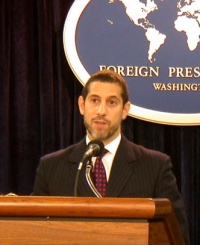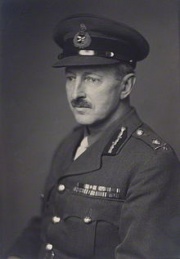Janusian Security Risk Management
(PMC) | |
|---|---|
| Parent organization | Risk Advisory Group |
| Type | commercial |
Janusian is a London based PMC that is part of the Risk Advisory Group and is closely connected to the Centre for the Study of Terrorism and Political Violence (CSTPV). David Claridge, its managing director, is the former Operational Director of CSTPV and is often seen interviewed or quoted on corporate media, in his capacity as a 'terror expert'. Its Director, Crispin Black, is a former government intelligence analyst.
Janusian has been in Iraq since April 2003, and provides mercenaries for the protection of foreign workers and diplomats.
Embedded Academics
In January 2005 a British and an Iraqi civilian were killed just north of Baghdad whilst working for security contractors Janusian Security Risk Management Ltd. The employees were apparently riding in a convoy near to the power station they worked at when they were ambushed. Janusian is one firm amongst multitude of private military companies providing armed guard and escort services in Iraq who, according the US Department of Defence, now employ around 25,000 people. It was apparently the first Western private military outfit to have an operational office and manager stationed permanently in Iraq.
The firm grew out of the network of interests that spans the risk management/private military industry and academic 'terrorology.' David Claridge, the managing director of Janusian is one of the founder members, and an Honorary Fellow of, the Centre for the Study of Terrorism and Political Violence in the University of St Andrews, Scotland. Janusian and the St Andrews Centre pool 'expertise' and share information. The following statement boasts of this relationship on the company's website:
- The new company has created a number of proprietary tools to identify and evaluate the terrorist, criminal and other physical threats facing businesses around the world. The first of these, a unique collaboration with the Centre for the Study of Terrorism and Political Violence at the University of St Andrews, includes shared access to research, intelligence sources and databases, and the expertise of the Centre's staff, as well as the development of sector-specific studies into areas of political risk
The close links between the St Andrews Centre and the security industry is typical of the 'embedded nature' of academic expertise in terrorism. In the same way that much of our information regarding the nature of the 'insurgency' in Iraq remains largely dominated by misinformation drawn from embedded journalism, so much expertise on contemporary terrorism originates from a pool of embedded academics with close links to the military industry. In other words, the academic study of terrorism is dominated by embedded academics.
A description of the St Andrews Centre as 'embedded' in the military industry is supported by its close ties to RAND Corporation. RAND Corporation has been perhaps the most influential military strategy think-tank in the US for almost 60 years. Its list of former staff and associates reads like a who's who of Bush regime apparatchiks. Condoleezza Rice and Donald Rumsfeld for example are both former staff members at RAND. Collaboration between the two institutions is most obvious in their conference and seminar programme. In one such joint venture in May 2004 St Andrews Centre academics made the key note speeches to a conference co-organised with Janusian and RAND Corporation. The conference brought together representatives from 88 corporations to discuss the importance of corporate counter-terrorism strategies.
Close institutional links are maintained by inter-locking positions held by two key individuals. Founder member of the St Andrew Centre, Bruce Hoffman, is a long-standing senior researcher with RAND Corporation. Hoffman was seconded by RAND to the Centre when is was set up in the early 1990s. Together with senior RAND analyst, Brian Jenkins, he remains a member of the St Andrews Centre's Advisory Council. Both of those RAND employees are also Honorary Senior Research Associates at the Centre. Amongst a host of impressive government appointments, Bruce Hoffman has been a member of the U.S. Department of Defense Counterterrorism Advisory Board and in November 1994, the CIA awarded Hoffman the US Intelligence Community Seal Medallion, the highest level of commendation given by the agency to a non-government employee. Brian Jenkins is currently recognised by the US government as one of the foremost world experts on terrorism for his work at RAND. He is a former Green Beret in US Army Special Forces and his previous "anti-terror" research is distinguished by his advocacy of a "low intensity" dirty war intervention by the US in Guatemala in the 1970s and the suggested use of a proxy army against the Nicaraguan Sandinista government in 1984.
In 2004, Hoffman was given the role of senior advisor on counter-terrorism and counter-insurgency to the Constitutional Provisional Authority, the US imposed government of occupation in Iraq. In this capacity, Hoffman followed a long line of St Andrews Centre associates through the revolving doors between military strategy and academic expertise. Major General Richard Clutterbuck, one of the seminal counter-insurgency theorists of the 1960s and early 1970s is closely associated with the St Andrews Centre. Clutterbuck's ideas on counter-insurgency were developed through his military experience in 13 post-war UK colonial conflicts. He was a member of the Advisory Council at the St Andrews Centre from its inception until his death in 1998. After Clutterbuck's demise, his archive was left to the St Andrews Centre and his lasting influence on the Centre has been noted by senior members. In his introduction to British Perspectives on Terrorism, Director of the St Andrews Centre, Paul Wilkinson recognizes this intellectual lineage, paying tribute to the work of both Clutterbuck, and Frank Kitson, yet another British Army commander turned counter-insurgency theorist.
The counter-insurgency school is best known for its promotion of 'dirty war' tactics which involve covert infiltration of local populations and violent targeting of opposition sympathisers. In counter-insurgency theory, terrorism and popular protest are viewed as part of the same 'spectrum of political violence'. In this analysis peaceful forms of dissent warrant the acquisition by law enforcement agencies of emergency powers to prevent an inevitable spiral into violent public disorder. The basic thesis is that military techniques of order management are necessary to prevent a further spiral into terrorism. Counter-insurgency theory legitimates strategies that range from the covert infiltration of 'suspect populations' to the assassination of key insurgents. It articulates a coercive model of power which views political settlement or negotiation as a sop to insurgency. The thorny question of why populations may wish to resist colonial rule in the first place doesn't tend to feature in the counter-insurgency manuals.
After leaving the armed forces and taking up an academic career, Clutterbuck quickly established a commercial use for his theories. As director of Control Risks in the early 1970s he set up the Control Risks Information Service, a division of the firm which specialised in advising and dealing with the 'political risks' to businesses operating in insecure environments. Control Risks Group is now reported to be one of the largest providers of armed security in post-war Iraq. At least 3 civilian employees of the company have lost their lives in active service during the occupation. There remains a strong link between the St Andrews Centre and Control Risks: the company regularly donates its archive to be used by the Centre for research purposes.
St Andrews Centre associates such as Claridge and Hoffman continue the long tradition of putting counter-insurgency theory into practice. Bruce Hoffman's term of office in the Coalition Provisional Authority has been most distinguished by his advancement of a new counter-insurgency theory and practice in Iraq. In a briefing paper written as adviser to the occupation regime, Hoffman pays tribute to Frank Kitson's 'magisterial' Low Intensity Operations, the text which set out a rationale for conducting hidden warfare against dissenting colonised populations, promoting the use of psychological operations against counter-insurgency. In doing so he articulates a newly revised version of counter-insurgency theory as a means of continuing the US occupation and defeating the insurgency. The revival of counter-insurgency theory will encourage the US to continue to use forms of torture, psyops and covert infiltration of Iraqi communities. Despite its highly dubious past, counter-insurgency theory is being put into practice in Iraq with the intellectual support of embedded academics who carry a torch for the long discredited theorists of colonial warfare.
Resources
- The issues discussed in this article are considered in more detail in a longer article 'Embedded Academics and the New Terrorism Thesis' which can be downloaded here.
- Bruce Hoffman's paper for the Coalition Provisional Authority on counter-insurgency in Iraq can be downloaded at: [1]
- Jonny Burnett and Dave Whyte Embedded Academics and Counter-Insurgency in Iraq Spinwatch, 7 December 2005.

